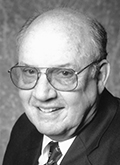Robert Giegengack, Earth and Environmental Studies
 Robert F. “Gieg” Giegengack, an emeritus professor of earth and environmental studies in the School of Arts and Sciences, died on June 4 after a brief illness. He was 83.
Robert F. “Gieg” Giegengack, an emeritus professor of earth and environmental studies in the School of Arts and Sciences, died on June 4 after a brief illness. He was 83.
Dr. Giegengack earned a BA in geology from Yale in 1960. He then earned an MS, also in geology, from the University of Colorado at Boulder and returned to Yale for his PhD in 1968. After graduating from Yale, he came to Penn as an assistant professor of geology. In 1972, he established the first environmental sciences major at Penn, forming a department in the School of Arts and Sciences that now encompasses the field of geology. The next year, Dr. Giegengack became an associate professor of geology, and later in the decade, he was appointed chair of the department. He eventually became a full professor. During his time at Penn, Dr. Giegengack engaged actively in Penn’s governance, chairing the University Council’s Academic Review Committee from 1987 to 1988 and the Faculty Senate’s Nominating Committee from 1995 to 1996. In 1978, he was appointed head of Penn’s Benjamin Franklin Scholars program, a position he held for over two decades; he also served on the board of the Penn Press. He was a co-founder and the inaugural director of the Institute for Environmental Studies and served on several temporary consultative committees across Penn.
Dr. Giegengack was renowned for his teaching. In 1979, he won Penn’s prestigious Lindback Distinguished Teaching Award. Fifteen years later, he won the Ira Abrams Distinguished Teaching Award (Almanac May 3, 1994). One citation for the Abrams Award described Dr. Giegengack as “the single most influential teacher I have encountered.” Another commentator said, “He gave us a sense and a beginning understanding of the interrelationship and wholeness of all the disciplines—humanities, natural and social sciences, and philosophy.” Dr. Giegengack also won the CGS (College of General Studies) Award for Distinguished Teaching, the Penn Friars Senior Society Faculty Award, and a Dean’s Award for Innovation in Teaching. Dr. Giegengack mentored over 1,000 undergraduate and graduate students, postdoctoral research associates, and young faculty. He taught an annual summer fieldwork course at the Yellowstone Bighorn Research Association in Montana.
Outside of his teaching duties in SAS, Dr. Giegengack was a member of the Graduate School of Fine Arts’ landscape architecture and regional planning faculty from 1970 to 1992; held a SEAS appointment from 1978 to 1985; and headed Penn’s short-lived College of Thematic Studies from 1974 to 1975. He was a pioneer of interdisciplinary studies, also teaching in the Wharton School and the School of Medicine. In 2003, Dr. Giegengack was named the Davidson Kennedy Professor (Almanac December 9, 2003), which recognized his curricular innovation as the director of the Master of Environmental Studies program. He retired from Penn and took emeritus status in 2008.
Dr. Giegengack conducted field investigations on every continent except Australia, including projects exploring the history of climate change in the Sahara and the role of scarce water resources in maintaining political tension in the Middle East. He recovered fossils of pre-human primates in India, led an expedition to find endangered cheetahs in Egypt, and discovered a dinosaur fossil in the Sahara that made headlines around the world. Beginning in 1994, he developed a series of academically-based community-service courses, which aimed to reduce exposure to environmental lead among young children in West Philadelphia, to reduce tobacco use among pre-adolescent children, and to reduce exposure to environmental asthma triggers in Philadelphia homes. Dr. Giegengack’s research was published widely in publications like Science, Nature, Geology, and the International Journal of Climatology.
Dr. Giegengack enjoyed woodworking, making birdhouses and beehives, and was busy every year at honey harvest time.
He is survived by his wife, Francesca; his children, Jon (Claire), Matt (Jen), and Kate (Patrick); and six grandchildren. Memorial gifts may be made to the Greg and Susan Walker Endowment, which enables students in programs of Earth & environmental science at Penn to pursue independent research projects: https://giving.aws.cloud.upenn.edu/fund?program=SAS&fund=401940.
